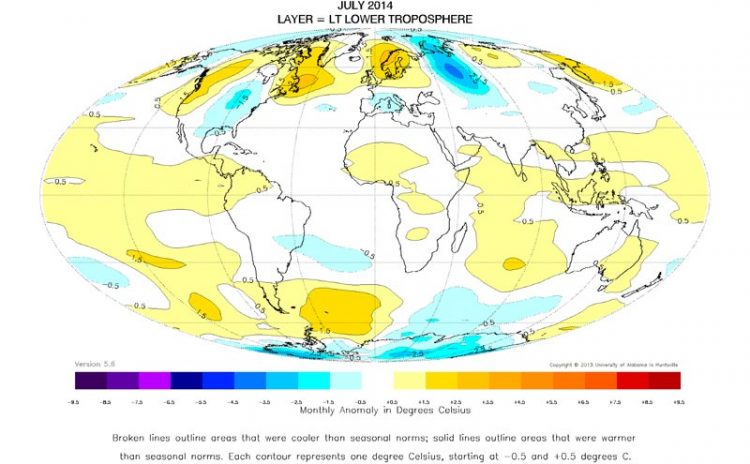July 2014: Global Climate Trend Since Nov. 16, 1978: +0.14 C Per Decade

UAH July 2014 Layer = LT Lower Troposphere
Global climate trend since Nov. 16, 1978: +0.14 C per decade
July temperatures (preliminary)
Global composite temp.: +0.31 C (about 0.56 degrees Fahrenheit) above 30-year average for July.
Northern Hemisphere: +0.29 C (about 0.52 degrees Fahrenheit) above 30-year average for July.
Southern Hemisphere: +0.32 C (about 0.58 degrees Fahrenheit) above 30-year average for July.
Tropics: +0.45 C (about 0.81 degrees Fahrenheit) above 30-year average for July.
June temperatures (revised):
Global Composite: +0.31 C above 30-year average
Northern Hemisphere: +0.32 C above 30-year average
Southern Hemisphere: +0.30 C above 30-year average
Tropics: +0.51 C above 30-year average
(All temperature anomalies are based on a 30-year average (1981-2010) for the month reported.)
Notes on data released August 5, 2014:
In the tropics, July 2014 was the second warmest July in the 36-year satellite record, only 0.03 C cooler than July 2009 and 0.06 C warmer than July 1998, according to Dr. John Christy, a professor of atmospheric science and director of the Earth System Science Center at The University of Alabama in Huntsville. The average temperature in the tropics during July was 0.45 C (about 0.81° F) warmer than seasonal norms for the month.
The global average temperature for July was 0.31 C (about 0.56 degrees Fahrenheit) warmer than seasonal norms, the fifth warmest July in the satellite record.
Compared to seasonal norms, the coldest place in Earth's atmosphere in July was over western Russia near the town of Verkhoturye (one of the oldest Russian towns east of the Urals), where Antarctic winter temperatures were as much as 3.77 C (about 6.79 degrees Fahrenheit) colder than seasonal norms. Compared to seasonal norms, the warmest departure from average in July was in northern Norway near the town of Borkenes. Temperatures there were as much as 2.93 C (about 5.27 degrees Fahrenheit) warmer than seasonal norms.
Archived color maps of local temperature anomalies are available on-line at:
As part of an ongoing joint project between UAHuntsville, NOAA and NASA, Christy and Dr. Roy Spencer, an ESSC principal scientist, use data gathered by advanced microwave sounding units on NOAA and NASA satellites to get accurate temperature readings for almost all regions of the Earth. This includes remote desert, ocean and rain forest areas where reliable climate data are not otherwise available.
The satellite-based instruments measure the temperature of the atmosphere from the surface up to an altitude of about eight kilometers above sea level. Once the monthly temperature data is collected and processed, it is placed in a “public” computer file for immediate access by atmospheric scientists in the U.S. and abroad.
Neither Christy nor Spencer receives any research support or funding from oil, coal or industrial companies or organizations, or from any private or special interest groups. All of their climate research funding comes from federal and state grants or contracts.
Contact Information
Dr. John Christy, (256) 961-7763
john.christy@nsstc.uah.edu
Dr. Roy Spencer, (256) 961-7960
roy.spencer@nsstc.uah.edu
Media Contact
All latest news from the category: Earth Sciences
Earth Sciences (also referred to as Geosciences), which deals with basic issues surrounding our planet, plays a vital role in the area of energy and raw materials supply.
Earth Sciences comprises subjects such as geology, geography, geological informatics, paleontology, mineralogy, petrography, crystallography, geophysics, geodesy, glaciology, cartography, photogrammetry, meteorology and seismology, early-warning systems, earthquake research and polar research.
Newest articles

A universal framework for spatial biology
SpatialData is a freely accessible tool to unify and integrate data from different omics technologies accounting for spatial information, which can provide holistic insights into health and disease. Biological processes…

How complex biological processes arise
A $20 million grant from the U.S. National Science Foundation (NSF) will support the establishment and operation of the National Synthesis Center for Emergence in the Molecular and Cellular Sciences (NCEMS) at…

Airborne single-photon lidar system achieves high-resolution 3D imaging
Compact, low-power system opens doors for photon-efficient drone and satellite-based environmental monitoring and mapping. Researchers have developed a compact and lightweight single-photon airborne lidar system that can acquire high-resolution 3D…





















